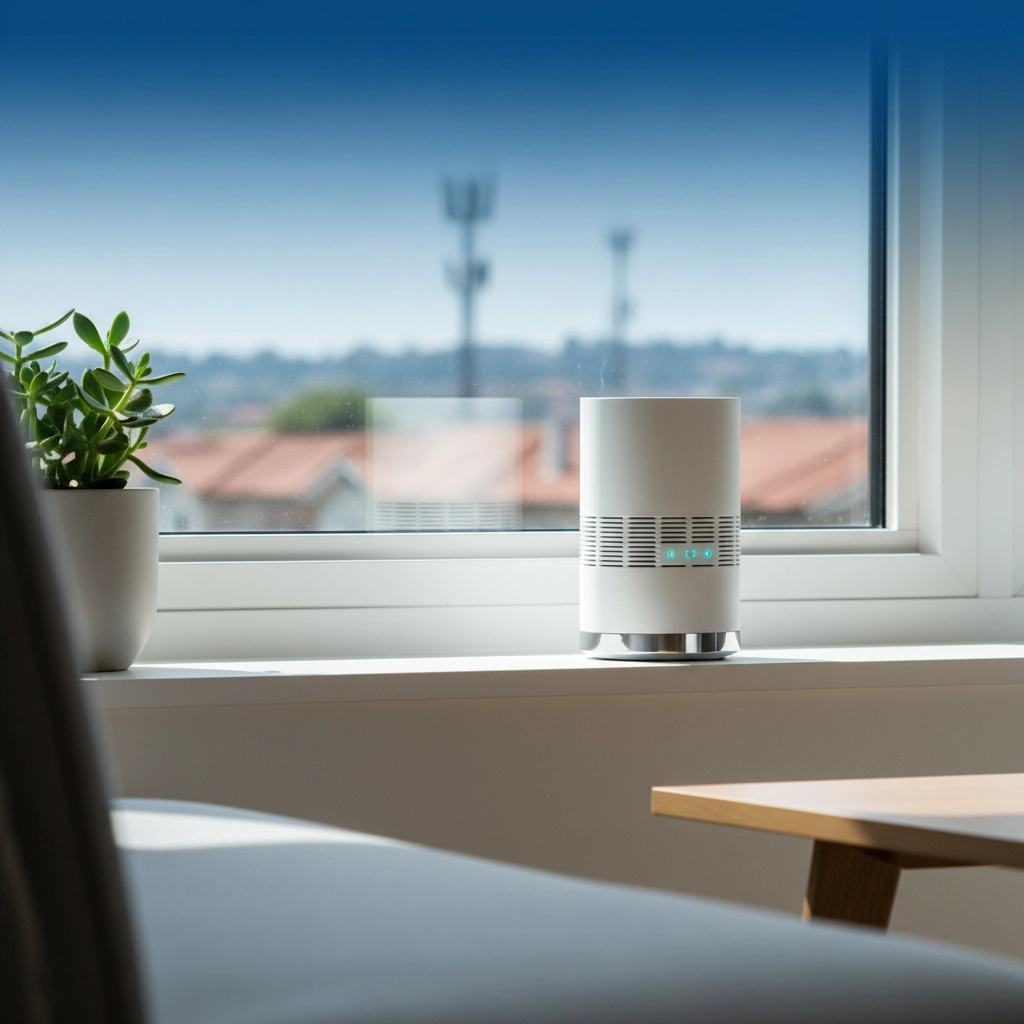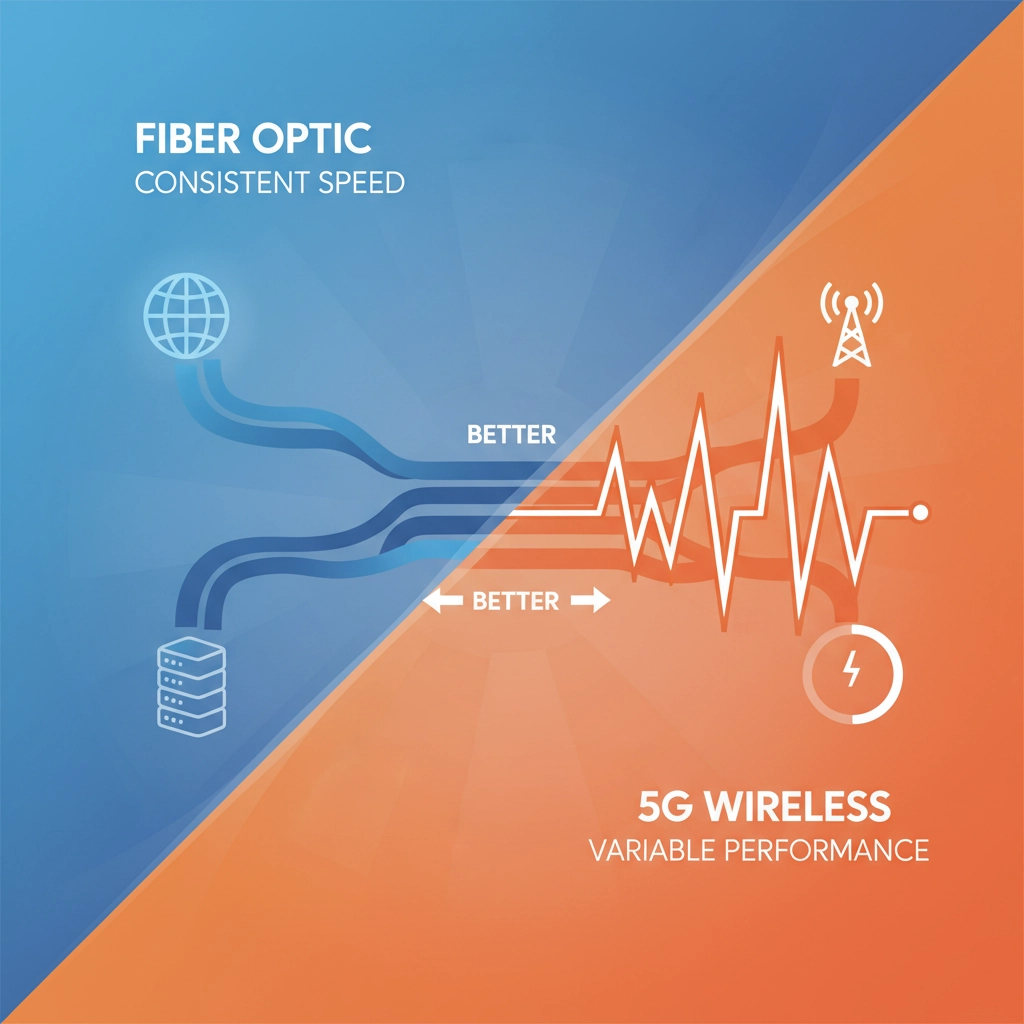Shopping for internet service feels like choosing between a sports car and a pickup truck: both get you where you need to go, but which one's right for your family's daily life? With 5G home internet making waves and fiber continuing to expand, let's break down which option will keep your household connected without the headaches.
The short answer? Fiber internet wins for most families thanks to rock-solid reliability and consistent speeds. But 5G has its moments, especially if you're in the right location or need something up and running yesterday.
What's the deal with fiber internet anyway?
Think of fiber internet as the premium highway system of the internet world. It uses thin strands of glass to shoot light signals back and forth, delivering data at crazy-fast speeds with almost zero interference.
Here's what makes fiber pretty awesome for families:
Speed that doesn't quit: Fiber delivers what it promises. If you're paying for gigabit speeds, you'll actually get gigabit speeds: whether you're streaming Netflix in the living room or joining a Zoom call upstairs.
Upload speeds that actually matter: Unlike cable internet where uploads crawl, fiber gives you the same speed going up as coming down. That's huge when multiple family members are video chatting, backing up photos to the cloud, or streaming their gameplay.
Gaming without the rage-quit moments: Fiber typically runs 10-20 milliseconds of latency, which means your online games respond instantly. No more blaming lag for that embarrassing defeat.
Weather-proof performance: Rain, snow, or shine: fiber just works. The signals travel through protected cables, so Mother Nature can't mess with movie night.
The downside? You need existing fiber infrastructure in your neighborhood, and installation usually means scheduling a tech visit.

So what's 5G home internet all about?
5G home internet is basically your phone's cellular connection, but beefed up for your whole house. Instead of cables running to your home, you get a wireless receiver that connects to nearby cell towers.
The good stuff about 5G:
Setup is stupid simple: Most 5G home internet comes with a plug-and-play device. No waiting for installers or drilling holes: just find a good spot by a window and you're online.
Growing coverage: If you live in or near a city, chances are good you've got 5G coverage. The networks are expanding fast, especially in suburban areas.
Flexibility: Moving? Just unplug your 5G device and take it with you. No cancellation fees or installation hassles at the new place.
But here's where things get tricky:
Speeds are all over the map: 5G can deliver anywhere from 50 Mbps to 400 Mbps depending on how close you are to a cell tower. That's a pretty big "depends" for something your whole family relies on.
Weather throws tantrums: Heavy rain or storms can slow down your connection. Not ideal when you're trying to work from home during a thunderstorm.
Rush hour slowdowns: When everyone in your neighborhood hops online at once, 5G can get congested and slow to a crawl.
Higher ping times: Expect 20-50 milliseconds of latency on a good day, and it can spike higher during busy periods.
The head-to-head breakdown
Let's get real about how these two stack up for everyday family life:
Speed consistency: Fiber wins hands down. You get what you pay for, every single time. 5G speeds fluctuate based on tower distance, weather, and network traffic.
Reliability: Fiber takes this one too. It's basically bulletproof once installed. 5G can be finicky depending on your location and conditions.
Gaming and video calls: Fiber's lower latency makes it the clear winner for anything that needs real-time response.
Multiple users: Got teenagers streaming TikTok while parents work from home? Fiber handles heavy simultaneous usage without breaking a sweat.
Installation and setup: 5G wins this round. Plug it in and you're done. Fiber usually requires professional installation.
Cost: Pretty much a tie. Both run $50-80 per month, though 5G sometimes starts cheaper (with variable performance).

Who should pick fiber?
Fiber makes sense if your family fits any of these scenarios:
Remote work warriors: If anyone works from home regularly, fiber's consistent upload speeds and reliability are worth their weight in gold. No more "Can you hear me now?" moments on important calls.
Gaming household: Serious gamers need that low latency. Fiber delivers consistent ping times that won't mess with competitive play.
Streaming fanatics: Multiple 4K streams running simultaneously? Fiber handles it without buffering drama.
Tech-heavy families: Smart home devices, cloud backups, video doorbells: fiber supports it all without slowing down.
Rural areas with fiber access: If you're in a rural area that actually has fiber infrastructure, grab it. 5G coverage gets spotty outside urban areas.
When 5G home internet makes sense
Don't write off 5G completely. It's the right choice in these situations:
Need internet NOW: Moving into a new place and need connectivity while you wait for fiber installation? 5G can bridge that gap.
Urban areas with strong 5G: If you live in a city center with excellent 5G coverage and don't have heavy internet needs, it could work just fine.
Temporary situations: Renting short-term or living somewhere temporarily? 5G's portability is handy.
Light internet usage: If your family mainly browses the web, checks email, and occasionally streams a show, 5G's variable performance might not bother you.
Fiber isn't available: Sometimes 5G is your only high-speed option. In that case, test the performance with your phone before committing.

The real-world test
Here's something most internet companies won't tell you: test before you commit. If you're considering 5G, take your 5G-capable phone to different spots around your house and run speed tests. Check performance at different times of day too.
For fiber, ask neighbors about their actual speeds and reliability. Advertised speeds don't always match real-world performance, though fiber typically comes much closer than other options.
Making the call for your family
Most families will be happier with fiber internet in 2025. It's the reliable choice that supports everything from work-from-home video conferences to late-night gaming sessions without hiccups.
5G home internet works best as either a temporary solution or for households with lighter internet needs in areas with strong 5G coverage.
The bottom line? If fiber's available in your area and you can handle the installation process, go for it. Your family will thank you when their video calls don't drop and their games don't lag.
Still trying to figure out what's available in your area or which speeds your family actually needs? Drop us a line and we'll help you sort through the options. No sales pressure: just straight talk about what works best for your household's internet needs.
After all, your internet connection should make your life easier, not give you another thing to worry about.

